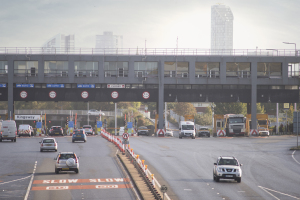Liverpool City Region Combined Authority Unveils Budget Proposals
- The precept is set to remain at £12.67 a year for Band A properties for third year in a row
- Modest increase in Transport Levy proposed, well below inflation
- Spending focused on economic recovery, including funding for projects delivering post-pandemic economic growth, adult education and bus reform
The Combined Authority will be asked to approve its budget for 2022/23 at its meeting on 21 January 2022.
Detailing its spending for the year ahead, the budget is focused on delivering mayoral priorities, with an emphasis on securing the city region’s economic recovery by prioritising investment in transport, infrastructure, skills and environment.
 The budget proposals include an ambitious £241 million capital funding programme, including completion of the procurement of a brand-new fleet of state-of-the-art trains, as part of Mayor Steve Rotheram’s plans to introduce a London-style transport system. The budget also details investment to progress the programme for bus reform, publishing a Bus Services Improvement Plan, outlining ambitious plans to provide services that are more frequent, reliable, and affordable.
The budget proposals include an ambitious £241 million capital funding programme, including completion of the procurement of a brand-new fleet of state-of-the-art trains, as part of Mayor Steve Rotheram’s plans to introduce a London-style transport system. The budget also details investment to progress the programme for bus reform, publishing a Bus Services Improvement Plan, outlining ambitious plans to provide services that are more frequent, reliable, and affordable.
The budget also includes ongoing investment in infrastructure projects that will help boost economic recovery, including LCR Connect, which is creating a 212km ultrafast digital network for the city region, COVID recovery initiatives, such as the next stage of the Future Innovation Fund, and flagships schemes such as the Shakespeare North Playhouse.
The importance of skills in the city region’s economic recovery is reflected in a focus on adult education, which sets out the Combined Authority’s priorities for the coming year, ensuring that all of the city region’s residents have the opportunity to develop the skills they need.
Included in the budget document is a proposal to freeze the mayoral precept that for the third year in a row.
The impact of COVID-19 on the city region’s finances, however, means that modest increases are proposed to the Transport Levy paid by the region’s six local authorities, and to Mersey Tunnels tolls, as announced last week.
The decision to freeze the regional precept is intended to avoid putting extra short-term financial pressure on residents who are struggling due to the COVID pandemic. 95% of households in the city region will continue to pay no more than 32 pence a week.
The Transport Levy was frozen for 2021/22, however higher inflation and demographic pressures mean that this position is not sustainable and therefore a 2% increase to the levy, from £97.4m to £99.35m is proposed.
The budget also includes a proposed increase to tunnel tolls for 2022/2023 with rates set to rise for the first time in five years, in response to increasing public sector budget pressures and increasing maintenance costs.
While there will still be a discount for Liverpool City Region residents using the Fast Tag or T-Flow prepayment systems, the cost of a single crossing is set to rise by 20p for car drivers from April 1, if the proposals are approved at this month’s Combined Authority meeting.
The rate change means many motorists will still be paying a full £1.10 less than the maximum amount authorised by the Tunnels Act, and only same toll as tunnels users in 2004 despite inflation since then being 76%.
Under the changes, most tunnel users will continue to benefit from the discounted toll available to Liverpool City Region residents – with around 60,000 regular daily prepaid Fast Tag or T-Flow users taking advantage of the reductions.
The budget paper also includes a proposal to introduce a one-off admin fee, expected to be no more than £10, for people applying for a concessionary travel pass. Residents in receipt of Universal Credit would be exempt from the fee. The Merseytravel concessionary travel scheme is one of the most generous in the country and entitles Merseyside residents to free train and bus travel from the age of 60, seven years before passes are available under the national scheme.
Speaking about the budget, Steve Rotheram, Mayor of the Liverpool City Region, said:
“COVID-19 has had a huge impact on everyone’s finances over the past two years and the Combined Authority is not immune to that. The costs of keeping our region running, supporting the local economy through the worst of the pandemic and investing to kickstart our recovery have been significant and will continue to be felt for some time.
“The government’s failure to deliver its promise of ‘whatever it takes’ in funding support has tied our hands financially. It means that difficult decisions need to be taken to keep vital public services running while also investing for the future.
“Over the last year and a half, we have provided more than £44m of support to over 4,000 businesses, keeping many afloat and safeguarding many, many thousands of local jobs. We distributed millions to small community groups who helped support their neighbours through the height of lockdown. We have funded transformative projects in every single part of our region – and launched a £150m COVID Recovery Fund to give the local economy a springboard to bounce back.
“Given the financial pressures the pandemic has forced on us – and the moral duty we have to tackle the climate emergency – we have been forced to make some difficult decisions. In doing so, we have been able to ensure that we can continue to invest in growing our region, attracting more well-paid jobs and investment, and building the London-style transport network local people deserve.”
 The Mersey Tunnels are not part of the national road network and receive no government funding to support their operation and upkeep. The loans originally taken out to fund the tunnels will not be paid off until 2048, with this money not only relating to the building of the tunnels but also to their maintenance and improvement. The payments on these loans are also fixed, with penalties incurred for paying them off early.
The Mersey Tunnels are not part of the national road network and receive no government funding to support their operation and upkeep. The loans originally taken out to fund the tunnels will not be paid off until 2048, with this money not only relating to the building of the tunnels but also to their maintenance and improvement. The payments on these loans are also fixed, with penalties incurred for paying them off early.
Millions of pounds are spent each year on running and maintaining the Queensway and Kingsway tunnels, which are over 80 and 50 years old respectively. Their electricity costs more than £1m a year.
The increase in tolls – which have been reduced or frozen for most users since 2017 – comes as the Combined Authority, like most local government organisations, continues to feel the financial impact of supporting local communities through the worst of the Coronavirus pandemic.
The change in toll fee will also help cover the shortfall in revenues faced due to a reduction in traffic compared to pre-pandemic levels. It will also enable the Combined Authority to continue to invest in supporting key public transport services for the benefit of the Liverpool City Region’s 1.6m residents.
The Liverpool City Region has set an ambitious target to achieve net zero by 2040 at the latest – a decade ahead of national targets – to tackle poor air quality locally and the global climate emergency. As part of this effort, the proposed changes include setting aside £500,000 to reduce tolls paid by buses – to support bus operators in cutting fares for cross-Mersey services and encourage people to choose public transport for cross-river journeys.
Latest News
Mayor launches ‘Merseyrail in Bloom’ initiative to make stations brighter, greener and more welcoming
Mayor announces £17m for first phase of new walking and cycling link for East Runcorn
Mayor unveils four-year blueprint for making the Liverpool City Region the best place to grow up, grow a family and grow a business
Mayor salutes city region’s ‘year of transformation’ as he eyes deeper devolution to ‘truly unleash potential’
Liverpool City Region Combined Authority to lead new regional Music Hub
